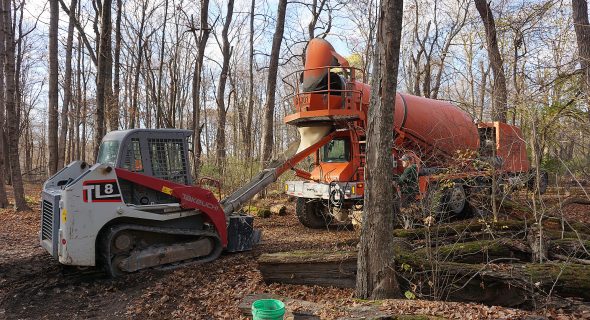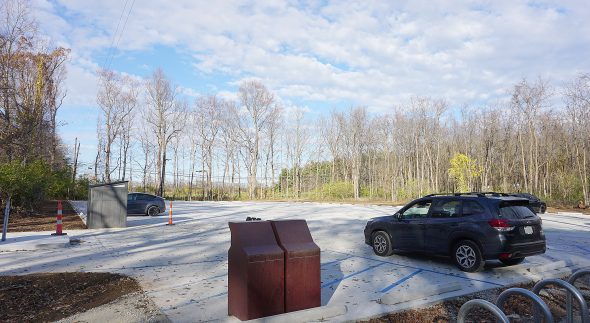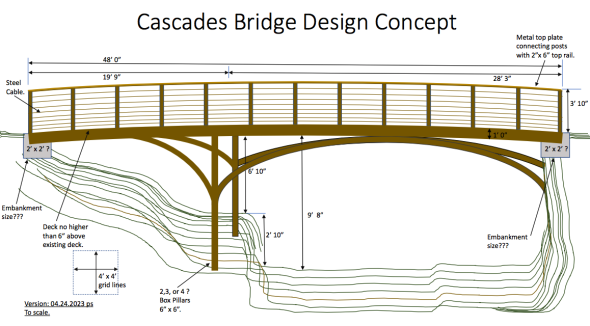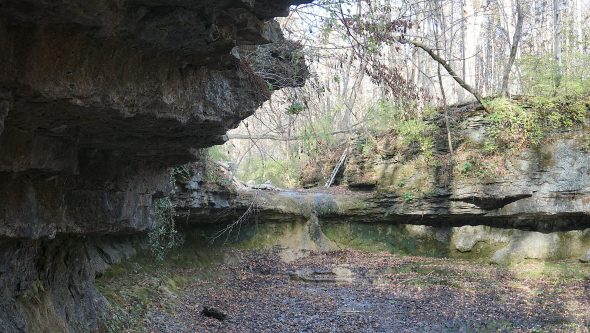
Construction crews have been at work building a new bridge over the Cascades. According to Glen Helen Executive Director Nick Boutis, the new bridge should be completed sometime next month. (Photo by Reilly Dixon)
No bridge too far in Glen Helen
- Published: November 18, 2024
Recently in Glen Helen Nature Preserve, the clatter of construction has joined the typical birdsong and music of the woods. Some trails are closed as machinery whirs daily. The industry almost dwarfs that of the beavers.
So, what is all that commotion?
Over the last several months, the Glen has both completed and begun a handful of trail and infrastructure improvements with the aim of making the 1,125-acre preserve more accessible for all.
Last Monday, Nov. 4, the Glen opened a new, 26,000-square-foot, parking lot on State Route 343 that provides closer access to some of the preserve’s most iconic features along the Inman Trail — namely the Cascades, the Raptor Center and the town namesake, the Yellow Spring.
The new lot along S.R. 343 — which has space for 80 cars, and will soon have new bathrooms, electric vehicle charging stations and over a dozen bike racks — opened just as the Glen closed its Corry Street lot for repaving that should conclude within the month.

The new 80-car parking lot on State Route 343 offers easier access to the Yellow Spring and Cascades. New bathrooms and electric car charging stations in the lot are forthcoming. (Photo by Reilly Dixon)
Beyond the parking lot improvements, crews have gone deeper into the Glen to enhance its trail system — perhaps most significantly, the bridge that once draped over the Cascades is currently missing. Crews are now working to install its replacement.
As Glen Helen Executive Director Nick Boutis told the News in a trailside interview, it was “simply time” for that half-century-old bridge to go.
“The old bridge did its job long enough,” Boutis said, “The I-beams that supported it had worn away to T-beams, and the top rail was totally rusted out. It was not too soon to take it down.”
The dismantling of the former bridge kicked off in earnest at the beginning of November; it was the latest bridge in the estimated 150-year history of connecting one upper rim of the waterfall to the other. The replacement will be a new, yet aesthetically similar bridge, still be affixed to the glacial limestone embankments that bookend the Cascades. Steel cables will line the handrails and a graceful arch will bend over the falls.
Boutis said it will re-open for public access sometime in December, and ought to stand the test of time thereafter.
At the time of Boutis’ interview with the News, crews were installing large concrete footers at the base of the forthcoming bridge.

“Look at that,” Boutis told this reporter, pointing to a frontloader cruising down the Inman Trail. “That’s not something you see every day in the Glen, is it?”
Elsewhere in the preserve, farther south from the Cascades, is the Talus Trail that winds beside a cliff face in the Yellow Springs Creek valley. That trail, too, is closed for the time being as crews build new bridges and boardwalks in areas where ongoing erosion has made for dangerous conditions. Boutis said he hopes that the Talus Trail will be reopened before the end of the year.
“Stormwater drainage points from the Village’s water treatment plant [on Grinnell Road] have made gullies all the way down to the bedrock along the trail,” Boutis explained. “So, we’re building three 30-foot bridges that go across those gullies and multiple boardwalks throughout the Talus Trail.”
He continued: “It’s all a problem of unnecessary erosion — a problem stemming from routing stormwater drains into the Glen and thinking, ‘Problem solved.’ As so many environmental issues go, we ought to consider the cumulative effect of our individual impacts.”
Taken together — the new and improved parking lots, the forthcoming replacement bridge over the Cascades, as well as the fortified Talus Trail — these efforts are the culmination of years-long fundraising and campaigning from the Glen Helen Association, or GHA, to reopen the preserve, restart educational programs and address public safety needs following the 2020 closure and transfer of ownership of the preserve.
As previously reported in the News, the GHA completed its $4.25 million campaign in February of this year with the help of contributions from 857 donors — including 210 from Yellow Springs. Earlier, in 2022, the GHA garnered an additional $750,000 in capital funds.
According to figures Boutis shared with the News, the new bridge over the Cascades cost $250,000; the new parking lot and bathrooms on 343 cost $600,000; the refurbished lot on Corry Street cost $350,000; and the bridge, boardwalk and trail improvements on the Talus Trail cost $210,000.
Accessibility and beyond
The new parking lot on 343 will lead directly into the preserve’s first, and soon-to-be-built American Disabilities Act, or ADA-compliant trail.
“From the new lot, you can go right to the Spring, or left to the Cascades,” Boutis said of the future pathway, still yet to be graded and graveled. “There won’t be pavement, and it’ll still be rustic, but these paths will be mostly flat without any roots or boulders. If you’re in a wheelchair, you can absolutely navigate it.”
While Boutis acknowledged that his and the GHA’s mission of making the Glen’s trails more accessible likely won’t extend to the trails in the far reaches of the preserve — mostly owing to prohibitive topography, he said — the forthcoming improvements further the Glen’s long-standing mission:
“Philosophically, we believe that it’s beneficial for everyone to have and develop a relationship with nature,” Boutis said. “And we believe that, as a preserve committed to environmental learning, we have a responsibility to see that our trail system isn’t preventing that from happening.”

The Cascades will soon sport a new bridge that crosses the falls. (Photo by Reilly Dixon)
Boutis added that he and other members of the GHA have, over the years, spoken with a number of senior Yellow Springs residents who, according to him, were once able to access the Glen, but in their later years, cannot any more — at least not as easily.
“So,” Boutis said, “what we have here is an opportunity to make it so our community can continue to access nature.”
Rebuilding bridges, improving trails and reckoning with deferred or eroding maintenance all comes with the territory, Boutis acknowledged of his and staff’s charge to steward the Glen.
Who can attest but the few, locally notorious beavers that moved into the Glen in 2021 and subsequently erected a dam, inadvertently creating a sprawling wetland. GHA workers have had to raise, rebuild and construct entirely new sections of a boardwalk near the dam several times, owing to the continually rising water levels — all thanks to the beavers’ handiwork.
“I was entirely wrong when the beavers first came here; I figured they’d have their dam and we’d have the boardwalk — a kind of parallel play,” Boutis said. “I thought we’d be able to change the environment, and they’d work around us. In fact, it was the exact opposite.”
As it turns out, bridge-making and trail improvements — even well beyond the sprawling dam — requires a similar kind of acquiescence to Mother Nature’s unexpected designs.
“What you sign up for in offering a nature preserve to the public is the ongoing maintenance of that access,” Boutis said. “Who knew that trees seem to prefer to fall only onto trails? Isn’t that true of anything humanity builds?”
He continued: “At the end of the day, what we’re trying to do with the things that we build is to build them in an aesthetically sensible way with materials that can last. But, even with that long-term thinking, just as we had to do with the beavers, we have to work around nature — but still, nature likes to work around us.”
One Response to “No bridge too far in Glen Helen”
The Yellow Springs News encourages respectful discussion of this article.
You must login to post a comment.
Don't have a login? Register for a free YSNews.com account.











As a GHA member in diaspora I am grateful for these improvements. I try to make it to Glen for a quick hike any time I am back in town for more than a few hours; it remains the treasure I remember. Thank you to all GHA donors, members, and staff.